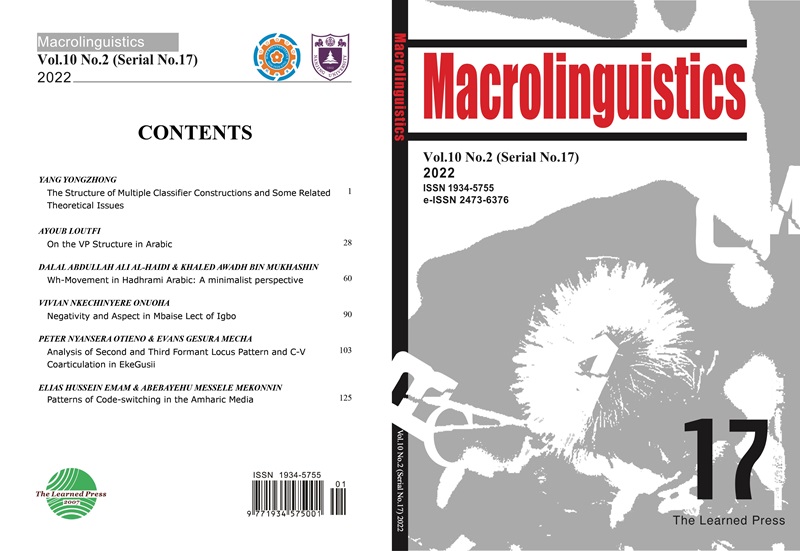探究阿姆哈拉语名义性别和言语性别的发展阶段:可加工性理论的证据
引用次数: 0
摘要
这篇文章的目的有两个。首先,探讨了埃塞俄比亚-闪米特语言之一阿姆哈拉语的名义性别和言语性别的发展顺序。其次,它为可加工性理论的类型合理性提供了经验证据。事实上,PT已经用不同类型的语言(如英语、意大利语和日语)进行了测试;然而,它还没有得到埃塞俄比亚语言,特别是埃塞俄比亚-闪米特语言的任何验证。通过图片描述任务、短篇故事、访谈、故事复述和发现差异任务,从16名受访者中收集了相关数据。对分析进行了分布分析,并使用出现标准确定了目标结构的出现点。因此,研究结果表明,性别分配的发展与可加工性理论的预测是一致的,即词汇过程先于短语过程,然后是s过程。此外,在所有发育阶段,男性比女性更早出现。然而,主动语态语境中的主谓一致标记出现在主谓一致之前的第二阶段。这一发现与可加工性理论的说法相反,该理论认为,主体一致性标记只出现在可加工性层次结构的第四阶段,而忽略了它们在专业背景下的发展阶段。本文章由计算机程序翻译,如有差异,请以英文原文为准。
Exploring the Developmental Stages of Amharic Nominal and Verbal Gender: Evidence for processability theory
The purpose of this article is twofold. First, it explores the order of the development of nominal and verbal gender of Amharic, which is one of the Ethio-Semitic languages. Second, it provides empirical evidence for the typological plausibility of processability theory (PT). In fact, PT has been tested in typologically different languages (e.g., English, Italian, and Japan); however, it does not have any validation from Ethiopian languages in general and Ethio-Semitic languages in particular yet. Relevant data was collected from sixteen respondents via picture description tasks, short storytelling, interviews, story re-telling, and spot the difference tasks. Distributional analysis was conducted for the analysis, and the point of emergence of target structures was determined using the emergence criteria. Accordingly, the result shows that the development of gender assignment is compatible with processability theory’s predictions in that lexical procedure precedes phrasal procedure, which is followed by S-procedure. Moreover, the masculine gender emerged earlier than its feminine counterpart at all developmental stages. However, subject agreement markers in pro-drop context emerged at stage two preceding subject-verb agreement. This finding is against processability theory’s claim that suggests subject agreement markers only emerge at stage four of the processability hierarchy disregarding their stages of development in pro-drop context in particular.
求助全文
通过发布文献求助,成功后即可免费获取论文全文。
去求助
来源期刊
自引率
0.00%
发文量
83
审稿时长
20 weeks
期刊介绍:
Macrolinguistics (ISSN 1934-5755, e-ISSN 2473-6376) is an international academic journal which is specialized in research papers of non-Indo-European linguistics. It is published biannually by The Learned Press and funded by the Double First-Class Initiative of Nanjing University. It aims at contributing to the complementarity and interaction of linguistic research worldwide.

 求助内容:
求助内容: 应助结果提醒方式:
应助结果提醒方式:


